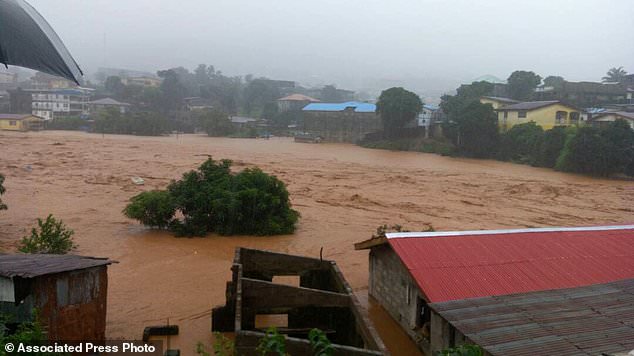
"The mudslide was massive with a large part of the hill falling off. I'm afraid homes stretching for a few kilometers might have been buried," said Liu Yu, a member of a Chinese medical team based in Sierra Leone.
Heavy rain in the early hours of Monday was reported to have caused the side of a hill to collapse, trapping hundreds of people in the hilltop town of Regent on the outskirts of Freetown, a coastal city with a population of about 1.2 million.
Bodies were buried under the debris of ruined homes or floating in water. The dead were taken to Freetown's Connaught Hospital, where people were stopped by servicemen from identifying the bodies in order to reduce chaos, reports said.
Sierra Leone's national broadcaster said earlier that more than 300 people were killed in the mudslide and flooding on Monday.
Liu, who had surveyed the site Monday when the mudslide happened, feared a slope behind the hilltop on the other side of the hill might also have caused further mudslide, and possibly leading to more damage.
"The roads at the site are almost impassable, causing difficulty for rescue efforts. And currently, diseases are also to be a major concern following the disaster," Liu warned.
"Up to 100 rescuers, including around 30 foreigners as well as local military, police and medical workers, are at the site conducting rescue work. Meanwhile, some five excavators are also cleaning ground," said Wang Bo, who was at the rescue site and gave an account of what his saw. Wang is a staff member of China Railway Seventh Group who works in the West African country.
"Based on the conditions at the site, only mechanical equipment can be deployed to conduct rescue work because it is very hard to do the work with bare hands," said Wang, who also called for a coordinated plan so as to conduct rescue work orderly.
It is feared that the death toll could rise in the worst ever natural disaster caused by heavy rain to hit the city, which has also left more than 2,000 people homeless.
Videos posted online by local residents showed yellow mud rushed to the streets of Freetown and the flood water reached as high as people's chest.
The western African country, one of the world's least developed countries, is still recovering from an outbreak of the Ebola virus in 2014 that caused more than 4,000 deaths.
Sierra Leone's President Ernest Bai Koroma said emergency services were doing everything possible to tackle the current disaster.
Koroma said in an address broadcast on television late Monday that an emergency response center had been set up in the town of Regent, which is worst hit.
United Nations Secretary-General Antonio Guterres on Monday also expressed condolences over the deaths in the country.
"The Secretary-General is saddened by the deaths and devastation caused by the mudslide and flooding in the town of Regent, Sierra Leone, and throughout Freetown," said Farhan Haq, Guterres' deputy spokesman.
"The Secretary-General extends his condolences to the people and Government of Sierra Leone for the loss of life and destruction caused by this natural disaster."
Source: Xinhua